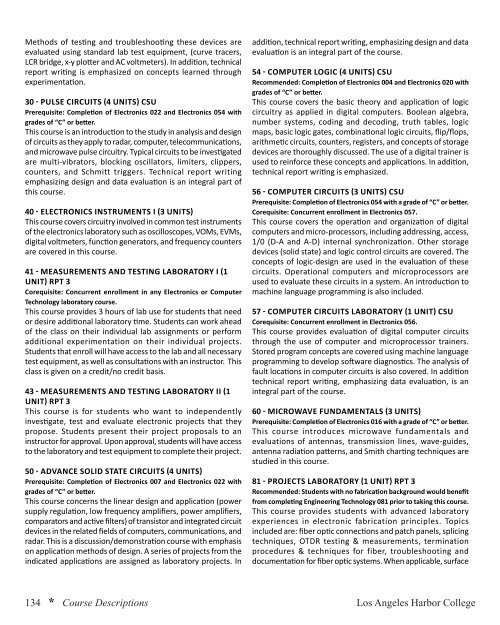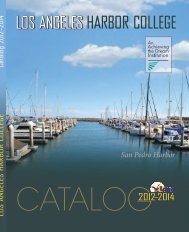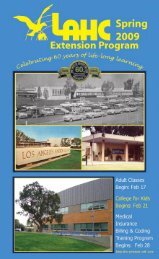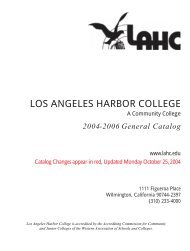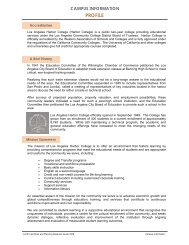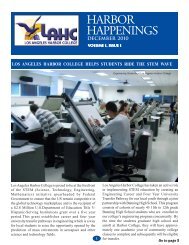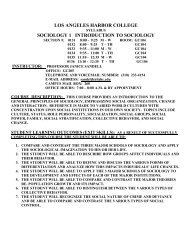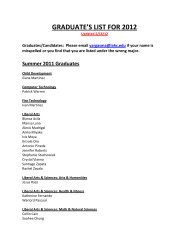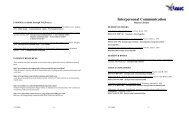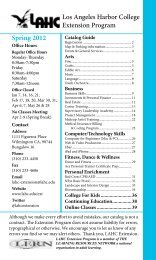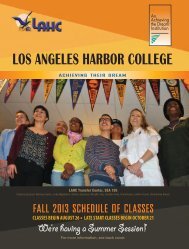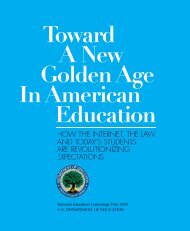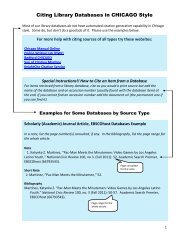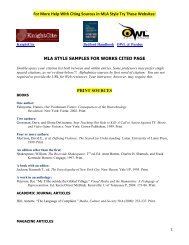degree and certificate program - Los Angeles Harbor College
degree and certificate program - Los Angeles Harbor College
degree and certificate program - Los Angeles Harbor College
Create successful ePaper yourself
Turn your PDF publications into a flip-book with our unique Google optimized e-Paper software.
Methods of testing <strong>and</strong> troubleshooting these devices are<br />
evaluated using st<strong>and</strong>ard lab test equipment, (curve tracers,<br />
LCR bridge, x-y plotter <strong>and</strong> AC voltmeters). In addition, technical<br />
report writing is emphasized on concepts learned through<br />
experimentation.<br />
30 PULSE CIRCUITS 4 UNITS CSU<br />
Prerequisite: Completion of Electronics 022 <strong>and</strong> Electronics 054 with<br />
grades of “C” or better.<br />
This course is an introduction to the study in analysis <strong>and</strong> design<br />
of circuits as they apply to radar, computer, telecommunications,<br />
<strong>and</strong> microwave pulse circuitry. Typical circuits to be investigated<br />
are multi-vibrators, blocking oscillators, limiters, clippers,<br />
counters, <strong>and</strong> Schmitt triggers. Technical report writing<br />
emphasizing design <strong>and</strong> data evaluation is an integral part of<br />
this course.<br />
40 ELECTRONICS INSTRUMENTS I 3 UNITS<br />
This course covers circuitry involved in common test instruments<br />
of the electronics laboratory such as oscilloscopes, VOMs, EVMs,<br />
digital voltmeters, function generators, <strong>and</strong> frequency counters<br />
are covered in this course.<br />
41 MEASUREMENTS AND TESTING LABORATORY I 1<br />
UNIT RPT 3<br />
Corequisite: Concurrent enrollment in any Electronics or Computer<br />
Technology laboratory course.<br />
This course provides 3 hours of lab use for students that need<br />
or desire additional laboratory time. Students can work ahead<br />
of the class on their individual lab assignments or perform<br />
additional experimentation on their individual projects.<br />
Students that enroll will have access to the lab <strong>and</strong> all necessary<br />
test equipment, as well as consultations with an instructor. This<br />
class is given on a credit/no credit basis.<br />
43 MEASUREMENTS AND TESTING LABORATORY II 1<br />
UNIT RPT 3<br />
This course is for students who want to independently<br />
investigate, test <strong>and</strong> evaluate electronic projects that they<br />
propose. Students present their project proposals to an<br />
instructor for approval. Upon approval, students will have access<br />
to the laboratory <strong>and</strong> test equipment to complete their project.<br />
50 ADVANCE SOLID STATE CIRCUITS 4 UNITS<br />
Prerequisite: Completion of Electronics 007 <strong>and</strong> Electronics 022 with<br />
grades of “C” or better.<br />
This course concerns the linear design <strong>and</strong> application (power<br />
supply regulation, low frequency amplifiers, power amplifiers,<br />
comparators <strong>and</strong> active filters) of transistor <strong>and</strong> integrated circuit<br />
devices in the related fields of computers, communications, <strong>and</strong><br />
radar. This is a discussion/demonstration course with emphasis<br />
on application methods of design. A series of projects from the<br />
indicated applications are assigned as laboratory projects. In<br />
addition, technical report writing, emphasizing design <strong>and</strong> data<br />
evaluation is an integral part of the course.<br />
54 COMPUTER LOGIC 4 UNITS CSU<br />
Recommended: Completion of Electronics 004 <strong>and</strong> Electronics 020 with<br />
grades of “C” or better.<br />
This course covers the basic theory <strong>and</strong> application of logic<br />
circuitry as applied in digital computers. Boolean algebra,<br />
number systems, coding <strong>and</strong> decoding, truth tables, logic<br />
maps, basic logic gates, combinational logic circuits, flip/flops,<br />
arithmetic circuits, counters, registers, <strong>and</strong> concepts of storage<br />
devices are thoroughly discussed. The use of a digital trainer is<br />
used to reinforce these concepts <strong>and</strong> applications. In addition,<br />
technical report writing is emphasized.<br />
56 COMPUTER CIRCUITS 3 UNITS CSU<br />
Prerequisite: Completion of Electronics 054 with a grade of “C” or better.<br />
Corequisite: Concurrent enrollment in Electronics 057.<br />
This course covers the operation <strong>and</strong> organization of digital<br />
computers <strong>and</strong> micro-processors, including addressing, access,<br />
1/0 (D-A <strong>and</strong> A-D) internal synchronization. Other storage<br />
devices (solid state) <strong>and</strong> logic control circuits are covered. The<br />
concepts of logic-design are used in the evaluation of these<br />
circuits. Operational computers <strong>and</strong> microprocessors are<br />
used to evaluate these circuits in a system. An introduction to<br />
machine language <strong>program</strong>ming is also included.<br />
57 COMPUTER CIRCUITS LABORATORY 1 UNIT CSU<br />
Corequisite: Concurrent enrollment in Electronics 056.<br />
This course provides evaluation of digital computer circuits<br />
through the use of computer <strong>and</strong> microprocessor trainers.<br />
Stored <strong>program</strong> concepts are covered using machine language<br />
<strong>program</strong>ming to develop software diagnostics. The analysis of<br />
fault locations in computer circuits is also covered. In addition<br />
technical report writing, emphasizing data evaluation, is an<br />
integral part of the course.<br />
60 MICROWAVE FUNDAMENTALS 3 UNITS<br />
Prerequisite: Completion of Electronics 016 with a grade of “C” or better.<br />
This course introduces microwave fundamentals <strong>and</strong><br />
evaluations of antennas, transmission lines, wave-guides,<br />
antenna radiation patterns, <strong>and</strong> Smith charting techniques are<br />
studied in this course.<br />
81 PROJECTS LABORATORY 1 UNIT RPT 3<br />
Recommended: Students with no fabrication background would benefit<br />
from completing Engineering Technology 081 prior to taking this course.<br />
This course provides students with advanced laboratory<br />
experiences in electronic fabrication principles. Topics<br />
included are: fiber optic connections <strong>and</strong> patch panels, splicing<br />
techniques, OTDR testing & measurements, termination<br />
procedures & techniques for fiber, troubleshooting <strong>and</strong><br />
documentation for fiber optic systems. When applicable, surface<br />
134 * Course Descriptions <strong>Los</strong> <strong>Angeles</strong> <strong>Harbor</strong> <strong>College</strong>


